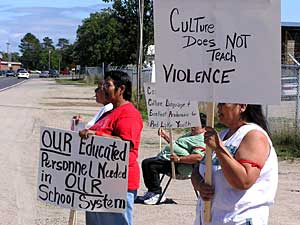|
Photos
|
Red Lake, Minn. — As the Red Lake district prepared for the beginning of a new school year, about a dozen protesters gathered in a gravel parking lot across from the district's main offices. Most of them were women, and many were former school employees. The protesters waved homemade signs critical of the district and its leaders. Tribal elder Tillie Colhoff says Red Lake's school children are being short-changed.
"The education system is bad," said Colhoff. "It has been for years. They push our kids through. I've worked up there. They could not read. They could not spell and something has to be done." The school's own statistics support the idea that something isn't working in Red Lake. The dropout rate is high, nearly half the class of 2004 didn't graduate. Red Lake's performance on standardized tests has improved in recent years, but those scores remains among the lowest in the state.
Many of the protesters say part of the solution is to add more Ojibwe culture into the curriculum. There are people on the reservation who say reviving the culture would help solve many of the tribe's social ills. Tribal member Doreen Wells worries about her grandchildren, who will soon be entering the school system. Wells says she wants the school to teach them about their Ojibwe identity.
"Our cultural values aren't being taught," Wells said. "And that's our strength of our people, is our values, our traditions our customs. And it's not being taught to our kids. And they say maybe it should be taught at home, but the kids' parents have been failed by the system also, and what can they teach when they don't know themselves."
Some of that frustration is being directed at the school district's leaders. After the March 21 shootings, there were two petitions calling for the removal of Superintendent Stuart Desjarlait. Critics claimed Desjarlait failed to provide leadership during the crisis.
Those petition efforts fizzled over the summer. Organizers say some people were reluctant to sign petitions because they feared losing their school district jobs. Now, a new petition to remove the superintendent is being circulated. Protester Tillie Colhoff says Desjarlait and other district leaders are not doing their job.
"They don't listen to the people, that's the thing," said Colhoff. "They're not listening to what the people want for their children. And that is needed, but people are afraid to speak out."
Desjarlait says some Ojibwe culture has been integrated into the curriculum. Kids in the elementary schools are taught the language and it's available to high school kids, too. He says spiritual customs are practiced daily in the schools.
"Our district is kind of in between," said Desjarlait. "There's a group that wants more culture. There's parents that want more academics, and they collide. And we're in the middle of trying to provide both. We get college reports that say 'well gee, some of your high school kids don't even know how to write. What are you doing over there? How come they can't write?' Well, maybe culture took up some of that time."
Desjarlait says when he was young his mother encouraged him to learn the Ojibwe language, but he never did. Desjarlait says he has no regrets about that. He says learning the language and cultural traditions like beading necklaces, is of little use to students who want to further their education beyond the reservation's borders.
"Any math class I took in college you know, they never asked me to pull out my beading needle," he said. "I never wrote any of my papers in Ojibwe. They didn't ask me at college, 'Will you please write this in Ojibwe?' They never did. They wanted English. Good English."
There was good news for the Red Lake School District this week. School attendance is back up to normal levels for the first time since the shootings.
Meanwhile, talk of educational reform continues. Tribal members have asked the Minnesota Department of Education to conduct a review of all district programs, including the use of Ojibwe culture in the classroom.







